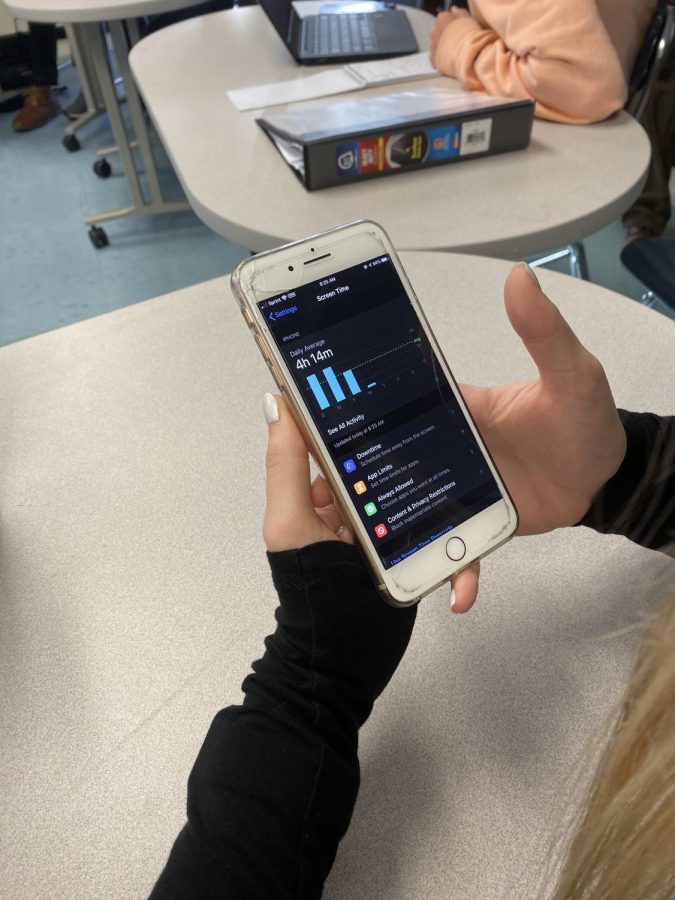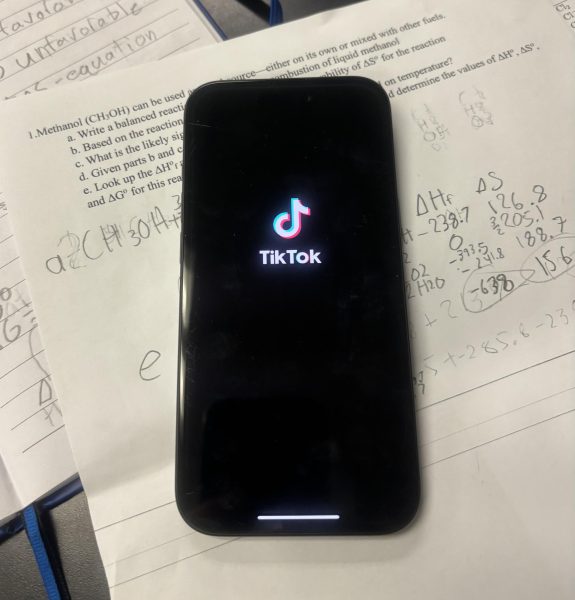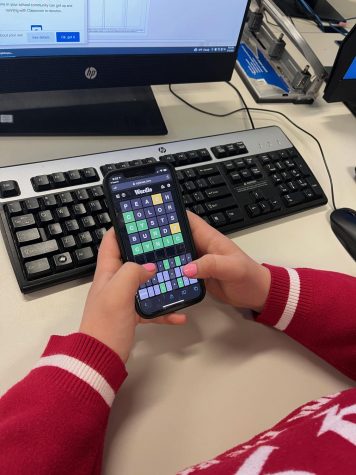Dangers of Giving Kids Cell Phones
The rise of new technology has risks regarding when a child should receive a cell phone
Triton Student Katherine Quigley looks at her screen time used on her phone (Takesian Photo)
Walking into Ms. Heather Walter’s room right before a quiz, students see a phone pouch has been placed on the wall to stop students from using their phones in class. Some students feel uneasy not being attached to their phones. The younger generation of children today are already facing the same dilemma
The technology of cell phones is a new part of parenting for current future parents. Phones can have a positive and negative impact on children’s lives. Young children have access to the infinite areas of the Internet. While some can use their phones for a positive impact on themselves and the people around them, others sometimes abuse the ability to avoid face-to-face confrontation and hurt people from the luxury of their screens. Children are able to develop a serious addiction to their phones if they are allowed to use them with little to no restrictions.
According to psychguides.com ” Cell phones are constantly being improved by expanding upon their functionalities, which in turn increases the likelihood of overuse and addiction. According to the PEW Research Center, 67% of smartphone owners have admitted to checking their phone for calls or messages when their phone didn’t vibrate or ring.1 This is one major sign of cell phone dependence and should serve as a warning to cell phone owners.¨
Dangers of Cyberbullying:
According to the Food and Drug Administration the average age for children to receive a phone is 12 years old and roughly 50 percent of those children have social media when they first get their phone. This means that children are exposed to cyberbullies or predators. Children are able to be contacted through social media by anyone who can access their social media page and get their personal information.
“Cyberbullying is something that is very dangerous and can not be ignored, If I were to give a kid a phone I watch over them to make sure they are responsible and staying away from a bully,” said Felicia Cardillo, a Triton senior.
Benefits of Having a Cell phone:
The biggest reason for children to receive a cell phone is so their parents can call them in an emergency and be able to track them from their phones.
“I got my phone when I was in 4th grade, so my parents could text me if anything happened and to make sure I was safe or needed to contact them,” said Katherine Quigley, a Triton senior.
Giving a child a phone can help them in case they get lost or need to call 911 for assistance if no one else is around. A phone also allows a child to be connected to their friends from long distances and feel a part of something if they are shy.
“When I got my first phone I was able to text my friends to see if they wanted to do something. It made things a lot easier to stay in touch if I was unable to see them in school,” said Brandon Baletsa, a Triton senior.
Addiction to a Phone:
Giving a young child a cell phone while they are still developing can lead to health effects at a very young age. Kids could begin to experience sleep disruption and restlessness when they are not able to use their phones.
“Kids should be getting a phone once they have gone into middle school. If they get one too early it can cause bad habits and addiction to their phones.” said Andrew Valianti, a Triton senior.
Many social media and apps are designed to get you hooked on it and continue to look or play in all the time
According to Catherine Price, author of How To Break Up With Your Phone, “every app on your phone has been expertly engineered to produce those very responses by designers skilled in manipulating brain chemistry to elicit addictive behaviors.”
How to Prevent an Addiction and Scammers:
Today’s technology allows parents to put restrictions on their children’s phones that can limit their screen time, specific apps they download and people they can contact.
“When I was a child and I got my first phone, my mom had some restrictions on my phone, but she trusted me enough to use it whenever I wanted. She had put restrictions on certain apps I can download by using a password,” said Balesta.
Parental controls on a smartphone allows parents to see what a child is doing and they can prevent them from making contact with a dangerous stranger.
“I have had people DM me on Instagram, asking me to tap on a link to go to a website. I knew that it was a scam but kids who are just getting their phones would have no idea that someone is setting them up,” Said Cardillo.
New rules like parental controls and screen timers will always be developing to secure and protect children’s ability to use their phones. Children and anyone who has a phone are open to all kinds of cyberbullying but with proper awareness and restrictions. Children can use their phones without a potential danger and not get addicted to using their phones.

Hello! My name is Charlie Takesian. I am a Senior at Triton High School. I Play on the Varsity Football Team and I love to watch the Patriots. I enjoy...








